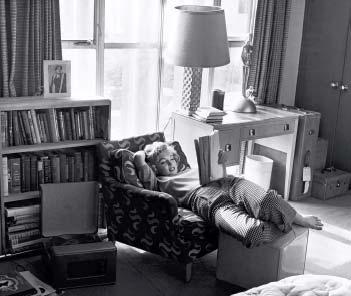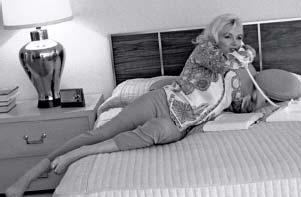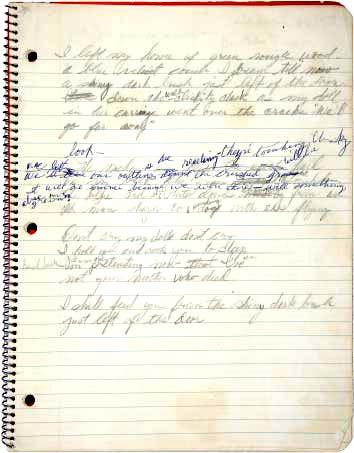Fragments: Poems, Intimate Notes, Letters (12 page)
Read Fragments: Poems, Intimate Notes, Letters Online
Authors: Marilyn Monroe

sweet and uncertainthough—it puts up a good struggle in the windthoughtrembling all the while. Those leaves will relax, expand in the sun and each raindrop they will resist even when
they’re
battered and ripped. I think I am very lonely—my mind jumps. I see myself in the mirror now, brow furrowed—if I lean close I’ll see—what I don’t want to know—tension, sadness, disappointment, my blue eyes dulled, cheeks flushed with capillaries that look like rivers on map
s
—hair lying like snakes. The mouth makes me the sadd
est
, next to my dead eyes. There is a dark line between the lips in the outline of several [illegible] waves in a turbulent storm—it says don’t kiss me, don’t fool me I’m a dancer who cannot dance.
When one wants to stay alone as my love (Arthur) indicates the other must stay apart.





Marilyn reading a script, Hotel Bel-Air, Los Angeles, 1952
Marilyn on her bed, Hollywood, 1962

RED LIVEWIRE NOTEBOOK

1958
In the spring of 1958, Marilyn had had enough of her dull country life. She wanted to start working again and was studying proposals from her agent and Fox, among which was an adaptation of Faulkner’s
The Sound and the Fury,
when, out of the blue, Billy Wilder sent her a two-page summary of an old German farce he was working on,
Some Like It Hot
. On July 8 she arrived in Los Angeles for the shooting.
Marilyn used only five pages of this big red spiral notebook. It can be dated from the summer of 1958, as it includes two lines of dialogue from
Some Like It Hot
. Why
these
two lines? (One might be self-referential; Marilyn was born in June just like the character of Sugar Kane.) What do they reveal about Marilyn’s musings?
Another possibility presents itself: that the pencil notes were written before the ones in blue ballpoint pen. In that case,
“after one year of analysis”
would refer to 1956 (she started her analysis with Dr. Hohenberg in 1955), with a hint of irony as to the result, as revealed in a short four-line poem expressing despair in the form of a cry for help: the desire to die rather than live.

I left my home of green rough wood—
a blue velvet couch I dream till now
a shiny dark bush just left of the door.
[Illegible] down the walk clickity clack as my doll
in her carriage went over the cracks—“We’ll go far away”
The meadows are huge the earth (will be) hard
on my back. The grasssurgedtouched
the blue and still white clouds changing from an
old man shapes to a smiling dog with ears flying
Look—
The meadows
are reaching—they’re touching the sky
We’ll leaveWe left our outlines against/on the crushed grass.
It will die sooner because we were there—will something
else have grown?
Don’t cry my doll don’t cry
I hold you and rock you to sleep.
hush hushI’mI was only pretending nowthatI’m (was)
not your mother who died.
I shall feed you from the shiny dark bush
just left of the door.

Jamaica 36/78
Dr. Mike Fayer
After one year of analysis
Help Help
Help
I feel life coming closer
when I all want
is to die.
Scream—
You began and ended in air
but where was the middle?
Notes:
It has been impossible to trace Dr. Mike Fayer.
According to Donald Spoto, Marilyn is thought to have sent the five-line poem “Help” to Norman Rosten in the summer of 1961 after having started regular consultations with Dr. Ralph Greenson. Spoto adds that Marilyn first wrote this poem, or perhaps message, in Arthur Miller’s notebook in London in 1956.
